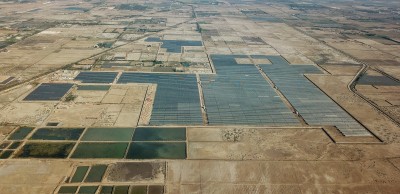Why it matters
Pakistan’s energy needs are rapidly growing. Over the past decade, the country experienced a severe gap between energy demand and supply. This has resulted in power shortages which have cost 2% of gross domestic product in recent years. The Pakistan government underwrites the importance for a sustainable energy mix to meet energy demands.
 In 2018, FMO provided USD 22.5 mln to Gharo Solar (Pvt.) Limited (Gharo Solar) for the development, construction and operation of a 50MW PV solar project in Pakistan. Other loans were provided by two local commercial parties: Bank Alfalah and Bank of Punjab. The project is situated in the south-eastern part of Pakistan in the province of Sindh. Its provincial capital, Karachi, is the largest city of Pakistan and among the world’s largest megacities. The solar project financed by FMO makes use of innovative bi-facial solar panels, which increase total energy generation. This is the first time that bi-facial solar panels are utilized in Pakistan and also one of the first in FMO’s energy portfolio. FMO’s senior loan of USD 22.5 mln will support the development, construction and operation. This project will serve power for almost 190,000 Pakistanis. This project provides economic benefits by boosting Pakistan’s energy self-reliance and mitigates the country’s carbon footprint.
In 2018, FMO provided USD 22.5 mln to Gharo Solar (Pvt.) Limited (Gharo Solar) for the development, construction and operation of a 50MW PV solar project in Pakistan. Other loans were provided by two local commercial parties: Bank Alfalah and Bank of Punjab. The project is situated in the south-eastern part of Pakistan in the province of Sindh. Its provincial capital, Karachi, is the largest city of Pakistan and among the world’s largest megacities. The solar project financed by FMO makes use of innovative bi-facial solar panels, which increase total energy generation. This is the first time that bi-facial solar panels are utilized in Pakistan and also one of the first in FMO’s energy portfolio. FMO’s senior loan of USD 22.5 mln will support the development, construction and operation. This project will serve power for almost 190,000 Pakistanis. This project provides economic benefits by boosting Pakistan’s energy self-reliance and mitigates the country’s carbon footprint.
Energy demand in Pakistan
 In recent years, Pakistan’s economy has been improving. Gross domestic product (GDP) grew by 5.3%, on average over the past 5 years. Due to its economic and population growth, Pakistan’s energy needs are rapidly growing. Pakistan has seen its energy demand increase by over 5% annually in recent years and is heavily dependent on fossil fuel imports, which makes itself vulnerable to global oil price volatility. Generally, there is a power shortage between 4GW and 6GW. The shortage stems also from a lack of investment in the infrastructure and has negatively impacted economic and social development in Pakistan. With abundant potential for renewable energy and decreased technology costs, renewable energy presents a promising solution. Only about 5 to 6% of the power to Pakistan's national electrical grid currently comes from modern renewable energy such as solar and wind, according to the country's Alternate Energy Development Board (AEDB). Since 2018, the Pakistan Government has actively prioritized and endorsed the potential for including clean, affordable and sustainable energy resources, to meet the energy needs in the country. Installed capacity of alternative and renewable energy sources in the power sector has already risen from 0.2% in 2013 to 5.2% of total installed capacity in 2018 (excluding hydro). This project supports Pakistan’s ‘30/’30/’30 goal: in 2030, 30% of the electricity stems from hydropower and 30% from other (non-water) renewables (40% from other sources).
In recent years, Pakistan’s economy has been improving. Gross domestic product (GDP) grew by 5.3%, on average over the past 5 years. Due to its economic and population growth, Pakistan’s energy needs are rapidly growing. Pakistan has seen its energy demand increase by over 5% annually in recent years and is heavily dependent on fossil fuel imports, which makes itself vulnerable to global oil price volatility. Generally, there is a power shortage between 4GW and 6GW. The shortage stems also from a lack of investment in the infrastructure and has negatively impacted economic and social development in Pakistan. With abundant potential for renewable energy and decreased technology costs, renewable energy presents a promising solution. Only about 5 to 6% of the power to Pakistan's national electrical grid currently comes from modern renewable energy such as solar and wind, according to the country's Alternate Energy Development Board (AEDB). Since 2018, the Pakistan Government has actively prioritized and endorsed the potential for including clean, affordable and sustainable energy resources, to meet the energy needs in the country. Installed capacity of alternative and renewable energy sources in the power sector has already risen from 0.2% in 2013 to 5.2% of total installed capacity in 2018 (excluding hydro). This project supports Pakistan’s ‘30/’30/’30 goal: in 2030, 30% of the electricity stems from hydropower and 30% from other (non-water) renewables (40% from other sources).
Repowering private solar sector
Power shortages are one of the biggest barriers to development. FMO’s mission is to empower entrepreneurs to build a better world and finances long-term projects which power economies, promote the transition to a low-carbon system and safeguard energy security. Although the energy demands in Pakistan are high, the solar sector is slowly taking-off. FMO’s loan in which some of our Funds invest, adds to the development of the solar sector by providing funds for a distinctive project. It takes more than finance to build a profitable and sustainable business for the long-run. Pakistan is growing in terms of number of internationally funded projects and Gharo Solar is an opportunity to increase the country’s professional capacity to deal with environmental and social matters. That’s why FMO has invested Capacity Development Funds into the Gharo Solar project to support the client to identify, manage and mitigate Environmental & Social related risks. By contributing to the cost of hiring for example external consultants, trainers and experts to facilitate the knowledge transfer and provision of technical expertise FMO enables its client to improve their portfolio quality for the better.
Invest for impact
For countries to prosper, proper utilization of energy is vital. Shortage problems affect the daily lives of people and significantly hinder economic growth. Investing in solar projects make room for renewable energy growth and will eventually support Pakistan on its path to long-term prosperity. Of the construction workforce 28% was recruited from nearby villages for different roles in civil and electrical installation. Signs that it has the potential to drive development in areas that are not connected to the grid, enlarging the investment impact. It will boost Pakistan’s energy self-reliance, as well as contribute to reducing greenhouse gas emissions. By making use of solar energy, roughly 54,000 ton carbon dioxide equivalents are avoided per year by this project alone.
![]()
![]()
![]()


